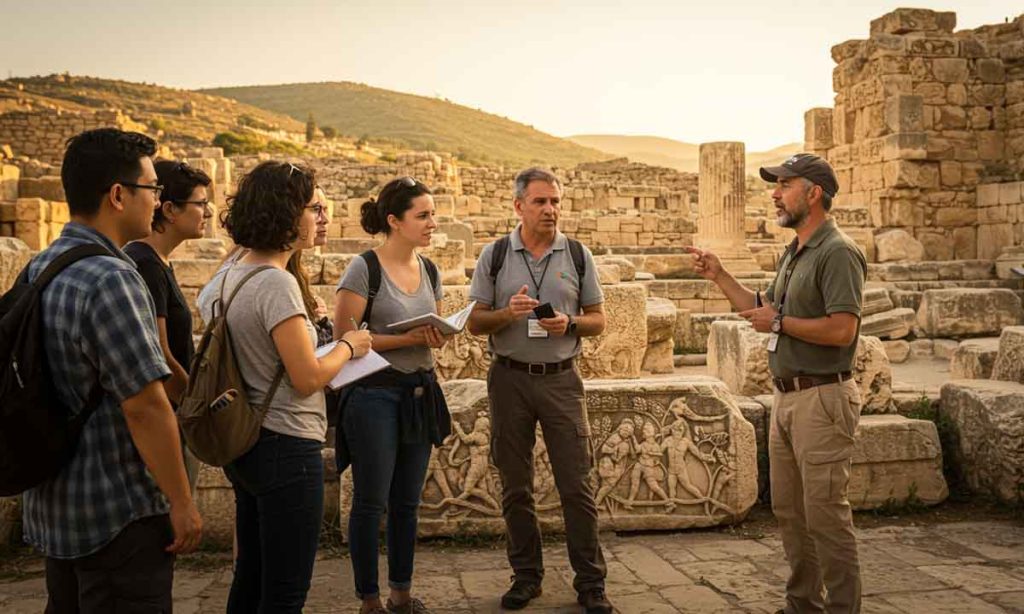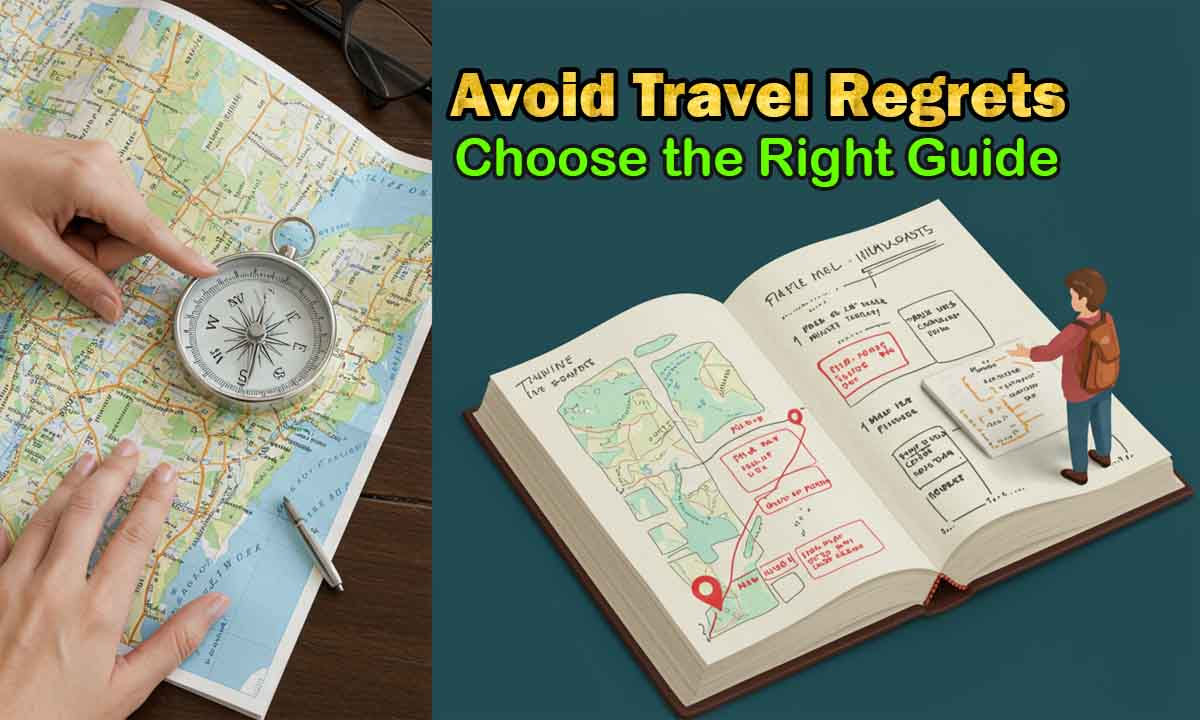The air in Marrakech was thick with the scent of cumin, leather, and mint tea. I stood at the edge of the chaotic Djemaa el-Fna square, buzzing with anticipation. This was the trip of a lifetime, and my first stop was a guided tour of the city’s hidden medinas. But within an hour, that excitement curdled into frustration. It became painfully clear that the traveler hired the wrong tour guide—and that traveler was me.
Instead of historical insights, I got a high-pressure sales pitch. Every “secret alley” led directly to a friend’s carpet shop or spice stall. My questions about the stunning architecture were met with vague, dismissive answers. My time, my money, and my connection to this incredible city were slipping away with every step.
This experience taught me a crucial lesson: your tour guide isn’t just a navigator; they are the curator of your travel memories. Choosing the wrong one is more than an inconvenience—it’s a costly mistake that can rob you of the very essence of your journey.
What Happens When the Traveler Hires the Wrong Tour Guide?
A bad tour guide experience goes far beyond a dull afternoon. The consequences can impact your wallet, your safety, and your entire perception of a destination.
Wasted Money and Lost Time

This is the most immediate cost. You’ve paid for a service you aren’t receiving. But the bigger loss is time. Your vacation days are precious. Spending hours on a subpar tour is time you can never get back, time you could have spent making genuine discoveries. In my case, half a day was lost to deflecting sales tactics instead of soaking in the history of the Red City.
Safety Concerns and Misinformation

A professional guide is trained in navigating local customs and ensuring the safety of their group. An unvetted guide might lead you into unsafe areas, be unaware of local scams, or provide dangerously incorrect information. Furthermore, they often deliver a script of myths and legends rather than verified history, leaving you with a distorted understanding of the culture you came to experience.
A Missed Connection with the Culture

The magic of travel lies in connecting with a place on a deeper, more profound level. An excellent guide is a storyteller, a cultural translator, and a bridge to the local community. When the traveler hired the wrong tour guide, that bridge was never built. You remain a surface-level spectator, watching the culture from behind a wall of disinterest and commercialism.
Red Flags: How to Spot a Bad Tour Guide Before You Book

Hindsight is 20/20, but you can learn to spot the warning signs before you hand over your money. Be aware of these red flags during your research and booking process.
- Vague or Non-Existent Itineraries: A professional guide will have a clear, well-structured plan. If the description is ambiguous (“We’ll see the best sights!”), Press for details.
- Focus on Shopping: If the tour description heavily mentions “visiting an authentic artisan co-op” or “great opportunities for souvenirs,” be wary. These are often code for commission-based shopping stops.
- No Official Credentials: In many countries, tour guides are required to hold a license or certification. Ask for their credentials. If they are evasive, it’s a major red flag.
- Poor Communication: Are their emails or messages filled with errors? Are they slow to respond or dismissive of your questions? This unprofessionalism will likely carry over to the tour itself.
- Exclusively Perfect, Vague Reviews: Everyone has an off day. If a guide has hundreds of 5-star reviews that all say “It was great!” without any specific details, be skeptical. Look for detailed reviews that describe what made the tour memorable.
- Pressure to Book Immediately: A confident, in-demand guide won’t need to pressure you into booking immediately. High-pressure sales tactics often signal desperation or a scam.
The Ultimate Checklist for Finding a Vetted, Professional Tour Guide

Now that you know what to avoid, let’s focus on the “how.” Finding a fantastic guide is an investment that pays off tenfold in incredible experiences.
1. Start with Reputable Sources
Skip the guy who approaches you on the street. Begin your search with trusted organizations.
* Official Tourism Boards: Websites like VisitBritain.com or the Japan National Tourism Organization often have directories of certified guides.
* Reputable Tour Marketplaces: Sites like Viator, GetYourGuide, and ToursByLocals are popular, but treat them like a search engine, not a final endorsement. Use them to find potential guides, then continue your vetting process.
* Traveler Communities: Rick Steves’ Europe and Lonely Planet’s Thorn Tree forum are excellent resources for finding candid recommendations from fellow travelers.
2. Read Recent, Detailed Reviews
Don’t just look at the star rating. Dig into the content of the reviews from the last 6-12 months.
- Look for specifics: Do reviewers mention the guide’s name? Do they share a specific story the guide told or a unique place they visited?
- Filter for your interests: If you’re a history buff, look for reviews that praise the guide’s historical knowledge, not just their friendly personality.
3. Ask the Right Questions (And Look for Specific Answers)
Before booking, send a direct message to the guide or company. Their answers will reveal a lot about their expertise and professionalism.
- “What makes your tour different from others?”
- “Can you tell me about your training and qualifications?” (A great way to check for licenses.)
- “Our group is very interested in [your specific interest, e.g., Roman history, local food, photography]. How would you tailor the tour for us?”
A passionate and knowledgeable guide will be delighted to answer these questions in detail. A poor guide will give you a generic, copy-pasted response.
4. Verify Their Credentials
As travel expert Rick Steves often emphasizes, a good guide is “a teacher, a friend, and a logistical wizard.” Credentials often back this level of professionalism. Ask if they are a member of a professional organization, such as the World Federation of Tourist Guide Associations (WFTGA), or if they hold a regional license. This is a key step that many people miss when a traveler hires the wrong tour guide.
The Difference a Great Guide Makes

On a later trip to Rome, I put these lessons to the test. I spent hours researching and found a licensed art historian who specialized in the Roman Forum. Her name was Chiara.
Instead of crowded main paths, she led us through quiet corners, pointing out ancient graffiti carved by Roman soldiers. She didn’t just state dates; she told the human stories behind the ruins—the political scandals, the love affairs, the triumphs. She brought the stones to life. That tour wasn’t an expense; it was the highlight of my entire trip to Italy.
That’s the difference. A bad guide shows you things. An excellent guide helps you see them.
Hiring a Tour Guide: Your Questions Answered
Hiring a Tour Guide: Your Questions Answered
What are the main warning signs of a bad tour guide?
The most common warning signs that you may have hired the wrong tour guide include a heavy focus on commission-based shopping stops, a vague or non-existent itinerary, and an inability to answer specific questions about history or culture. Also, be wary of guides who lack official licenses (in countries where they are required) and those who have only generic, non-detailed reviews online.
What should I do if I realize I’m on a bad tour right now?
If you’re in the middle of a bad tour, you have a few options. First, try to politely redirect the guide by asking specific questions about your interests. If that fails and the tour is primarily focused on unwanted shopping, it may be best to cut your losses. Politely inform the guide that you need to leave and do so, especially if you feel your time is being wasted. Afterward, be sure to leave an honest and factual review on the platform where you booked, and request a refund if the service did not meet the advertised standards.
Is hiring a licensed tour guide worth the money?
Absolutely. While they may cost more upfront, licensed or certified guides are an investment in the quality and safety of your trip. They have been trained and tested on historical facts, safety procedures, and local regulations. This ensures you receive accurate information, avoid scams, and stay safe, ultimately providing far more value than an unvetted guide.
How can I find a trustworthy tour guide for my trip?
To find a trustworthy guide, start your search on reputable platforms. Check your destination’s official tourism board website, look for recommendations in trusted travel forums like Lonely Planet or Rick Steves, and use established booking sites. Most importantly, vet them yourself by reading recent, detailed reviews and asking them specific questions about their qualifications and how they can tailor the tour to your interests before you book.
Should I still tip a tour guide if the tour was bad?
Tipping customs vary by country, but in the U.S. and many other regions, a tip is a reward for good service, not an obligation. If your guide was unprofessional, provided misinformation, or wasted your time, you are not required to tip. If the tour was simply average but not terrible, a smaller tip might be appropriate. Use your judgment, but never feel pressured to reward a poor experience.
Conclusion: Your Guide is Your Gateway, Choose Wisely
Your choice of a tour guide is one of the most impactful decisions you’ll make when planning your travels. It can be the difference between a frustrating, forgettable day and a cherished, lifelong memory.
Remember the story of the traveler who hired the wrong tour guide. Learn from that costly mistake. Do your research, watch for the red flags, ask probing questions, and invest in a professional who is as passionate about their home as you are about exploring it. Your future travel self will thank you.
Ready to plan your next adventure? Please share this article with a fellow travel lover to help them find the perfect guide!
Sources
- U.S. Department of State – Travel Advisories: For up-to-date safety information on your destination. travel.state.gov
- Lonely Planet: A trusted resource for traveler forums and destination-specific advice. lonelyplanet.com/thorntree
- World Federation of Tourist Guide Associations (WFTGA): An organization promoting professional standards for tour guides worldwide. wftga.org
- National Geographic Travel: For inspiring stories and expert travel tips. nationalgeographic.com/travel
Read More : Travel Surgical Tech Jobs: How to Start, Where to Go & What to Expect in 2025





Yes Fixed